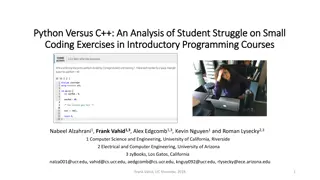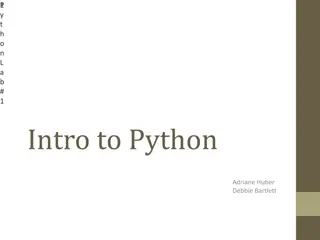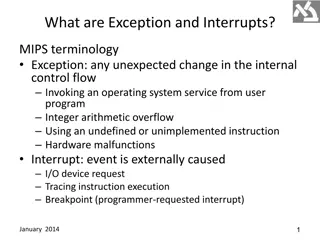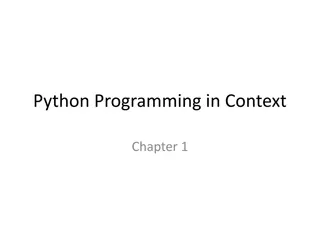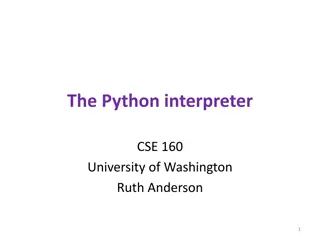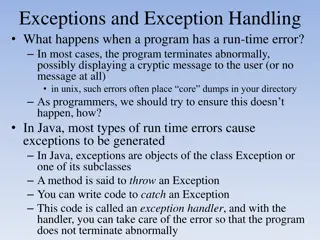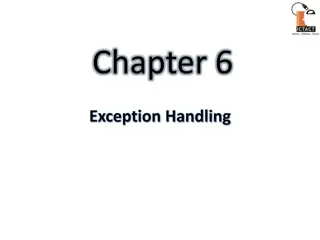Python Exception Handling
Python presents a unique approach to handling exceptions during programming. Learn how to raise and handle exceptions effectively, ensuring smooth program flow and error management. Explore the philosophy behind Python's exception handling and discover practical examples of implementation.
Download Presentation

Please find below an Image/Link to download the presentation.
The content on the website is provided AS IS for your information and personal use only. It may not be sold, licensed, or shared on other websites without obtaining consent from the author.If you encounter any issues during the download, it is possible that the publisher has removed the file from their server.
You are allowed to download the files provided on this website for personal or commercial use, subject to the condition that they are used lawfully. All files are the property of their respective owners.
The content on the website is provided AS IS for your information and personal use only. It may not be sold, licensed, or shared on other websites without obtaining consent from the author.
E N D
Presentation Transcript
Exceptions There are two approaches to living life as a religious: Before you do anything, you ask for permission Strengthens humility and denial of self Do something and then ask for pardon Strengthens your Ego too much, but makes it easier on the superior Similarly: There are two approaches to the risks of live: Make sure you are prepared for anything Just live your life and deal with the consequences of your errors. In programming, Python tends to fall squarely into the second category But it makes more sense than in real life
Exceptions RAISING AN EXCEPTION interrupts the flow of the program HANDLING AN EXCEPTION puts the program flow back on track or deals with an error situation Such as out of memory, file cannot be found, CPU illegal instruction error, division by zero, overflow,
Python Philosophy Philosopher s Football Handle the common case. And deal with the exceptions.
C, Java, C++ Philosophy C: check before you assume Java, C++: Use exceptions to handle bad situations Python: Use exceptions for the not so ordinary
Python If an instruction or block of instruction can cause an error, put it in a try block. try: int(string) Converts the string into an integer Notice that we are not using the result of the conversion, we just attempt the conversion
Python Exceptions Then afterwards, handle the exception. You should, but are not required to specify the possible offending exception try: int(string) except ValueError: print( Conversion error ) If the conversion fails, a ValueError is thrown This block handles the exception
Python Exceptions How do you find which error is thrown: You can cause the error and see what type of error it is You can look it up Division by zero creates a ZeroDivisionError
Python Exceptions Putting things together: Testing whether a string represents an integer def is_int(string): try: int(string) return True except: return False Try out the conversion
Python Exceptions Putting things together: Testing whether a string represents an integer def is_int(string): try: int(string) return True except: return False We return True Try out the conversion It worked:
Python Exceptions Putting things together: Testing whether a string represents an integer def is_int(string): try: int(string) return True except: return False Try out the conversion It did NOT work: An exception is thrown We return FALSE
Python Exceptions As you can see from this example, the moment an exception is thrown, we jump to the exception handler.
Python Exceptions When to use exceptions and when to use if Recall: Using if is defensive programming Recall: Using exceptions amounts to the same degree of safety, but is offensive Rule of thumb: If exceptions are raised infrequently, then use them
Python Exceptions Let s make some timing experiments Define two functions that square all elements in a list, if the elements are integers. def square_list(lista): result = [] for element in lista: if element.isdigit(): result.append(int(element)**2) result = [] for element in lista: try: result.append(int(element)**2) except: pass def square_list2(lista):
Python Exceptions The pass instruction: When Python expects a statement, but we don t have one: Just use pass The No-Operation instruction
Python Exceptions Recall how to use the time-module to obtain the CPU (wall-clock) time We use this to measure execution time First a list that only contains integers def timeit(function, trials): lista = [str(i) for i in range(1000000)] count = 0 for _ in range(trials): start = time.time() lista2 = function(lista) count += time.time()-start return count/trials
Python Exceptions Result: Exceptions are somewhat faster
Python Exceptions What if none of the list elements are integers: def timeit(function, trials): lista = ["a"+str(i) for i in range(1000000)] count = 0 for _ in range(trials): start = time.time() lista2 = function(lista) count += time.time()-start return count/trials Exceptions are much slower
Python Exceptions What about if the letter is at the end def timeit(function, trials): lista = [str(i)+"a" for i in range(1000000)] count = 0 for _ in range(trials): start = time.time() lista2 = function(lista) count += time.time()-start return count/trials Exceptions are still much slower
Self Test Define a function that calculates the geometric mean of two numbers. Use an exception to deal with a ValueError, arisen by taking the square-root of a negative number Here is the if-version. We return None if there is no mean. def geo(x, y): if x*y > 0: return math.sqrt(x*y) return None
Self Test Solution def geoe(x,y): try: return math.sqrt(x*y) except ValueError: return None
Multiple Exceptions We can write an exception handler that handles all the exceptions This is discouraged since there are just too many exceptions that can occur such as out-of-memory, system-error, keyboard- interrupt In this case, the except clause specifies no exception try: accum += 1/n except: print( something bad happened ) No exception specified Handler handles everything
Multiple Exceptions Normally, you want to specify which exceptions you are handling You can specify several exception handles by repeating the exception clause Or you can handle a list of exceptions def test(): try: f = open("none.txt") block = f.read(256) except IOError: print("something happened when reading the file") except EOFError: print("ran out of file") except (KeyboardInterrupt, ValueError): print("something strange happened") The parentheses are necessary
Cleaning Up Sometimes you need to make sure that failure-prone code cleans up Use the finally clause Guaranteed to be executed Even with return statements Even when exceptions are raised
Example for finally clause If we open a file without the if-clause, we are morally obliged to close it Let s say, if you have a long-running process that only needs a file for a little time, you should not hog the file and prevent others from accessing it.
Example for finally clause def harmonic(filename): """ Assumes that the elements in the file are numbers. We return the harmonic mean of the numbers. """ count = 0 accumulator = 0 try: infile = open(filename, encoding="utf-8") for line in infile: for words in line.split(): accumulator += 1/int(words) count += 1 return count/accumulator except ZeroDivisionError: print("saw a zero") return 1000000000 except ValueError: print("saw a non-integer") return 0 finally: print("I am done and closing the file") infile.close() Return in the try block Return in the handler But finally is guaranteed to run before any of the returns
Raising exceptions You can also raise your own exception You can even define your own exceptions when you have understood classes Just say: raise ValueError or whatever the exception is that you want to raise.
Self Test Recall that the finally clause is always executed. What is the output of the following code def raising(): try: raise ValueError except ValueError: return 0 finally: return 1
Answer The functions returns 1 The exception is raised and control passes to the exception handler Before the exception handler can return, the finally clause is executed And that one returns 1
Multiple Exceptions It is common that Python code throws multiple exceptions Can list different exceptions using a tuple and handle them all try: client_obj.get_url(url) except (URLError, ValueError, SocketTimeout): Or write different exception handlers client_obj.remove_url(url) try: client_obj.get_url(url) except (URLError, ValueError): client_obj.remove_url(url) except SocketTimeout: client_obj.handle_url_timeout(url)
Handles to Exceptions Exceptions are classes that have methods To gain access use the as keyword try: f = open(filename) except OSError as e: if e.errno == errno.ENOENT: print('file not found') elif e.errno == errno.EACCES: print('permission denied') else: print('unexpected error')
Multiple Exceptions More than one exception can be triggered The first matching exception handler will handle, even if a more specific exception handler is available try: f = open(a_missing_file) execpt OSError: print('it failed') except FileNotFoundError: print('File not found') prints out 'it failed'
Multiple Exceptions Exceptions are in a hierarchy try: except Exception as e: print(e) catches all exceptions except SystemExit, KeyboardInterrupt, GeneratorExit If you want to catch those, change Exception to BaseException
Creating Custom Exceptions To create a new exception, just define a class that derives from Exception class NetworkError(Exception): pass class TimeoutError(NetworkError): pass
Creating Custom Exceptions If your custom exception overrides the constructor Make sure you call the exception class constructor class CustomError(Exception): def __init__(self, message, status): self.message = message self.status = status Parts of Python and libraries except all exceptions to have an .args attribute, that will be provided by calling the super
Chaining Exceptions Raise an exception in response to catching a different exception, but include information about both exceptions in the traceback def example(): try: int('N/A') except ValueError as e: raise RuntimeError('A parsing error occured') from e
Assertions To prevent error conditions, can use assertions E.g.: your code only runs on a linux machine import sys assert ('linux' in sys.platform), 'this code runs on linus only') If the condition is violated, throws an AssertionError But the assert statements are optimized away when
Else Statement Else block after a try block is executed only if no exception was raised
Else Statement Exceptions in the else block would not be caught by the current try block for arg in sys.argv[1:]: try: f = open(arg, 'r') except OSError: print('cannot open', arg) else: print(arg, 'has', len(f.readlines()), 'lines') f.close()
Exercises The following code is potentially buggy. info = [{'score': 3, 'confidence': 2}, {'score': -1, 'confidence': 4}, {'score': 1, 'confidence': 4}, {'confidence': 0}] def get_total_score(info): total = 0 for item in info: total += item['score'] return total get_total_score(info)
Solutions def get_total_score(info): total = 0 number_of_items = 0 for item in info: try: total += item['score'] except KeyError: pass else: number_of_items += 1 return total/number_of_items print(get_total_score(info))
Exercises The following code is potentially buggy. import os def check(directory): for file_name in os.listdir(directory): with open(file_name) as infile: nr = len(infile.readlines()) print(file_name, nr)
Solutions import os def check(directory): for file_name in os.listdir(directory): try: with open(file_name) as infile: nr = len(infile.readlines()) print(file_name, nr) except UnicodeDecodeError: print('unicode decode error in', file_name) except IsADirectoryError: print(f'{file_name} is a directory')




